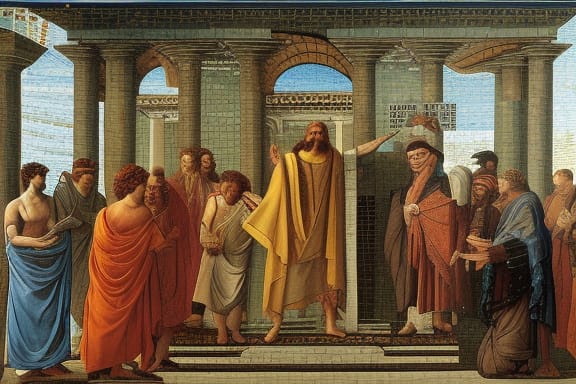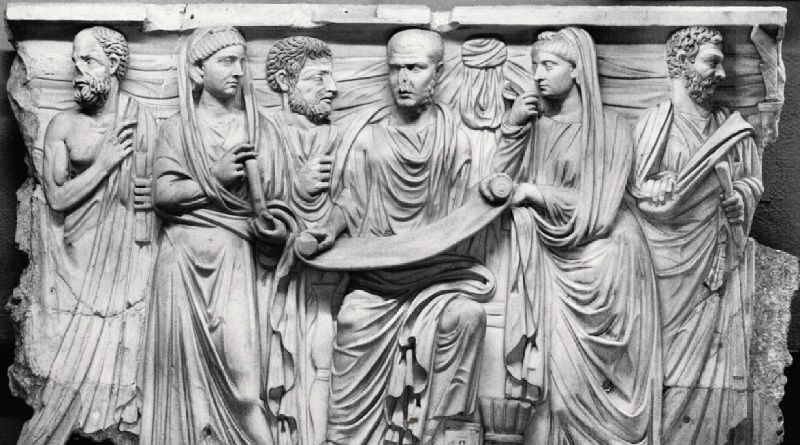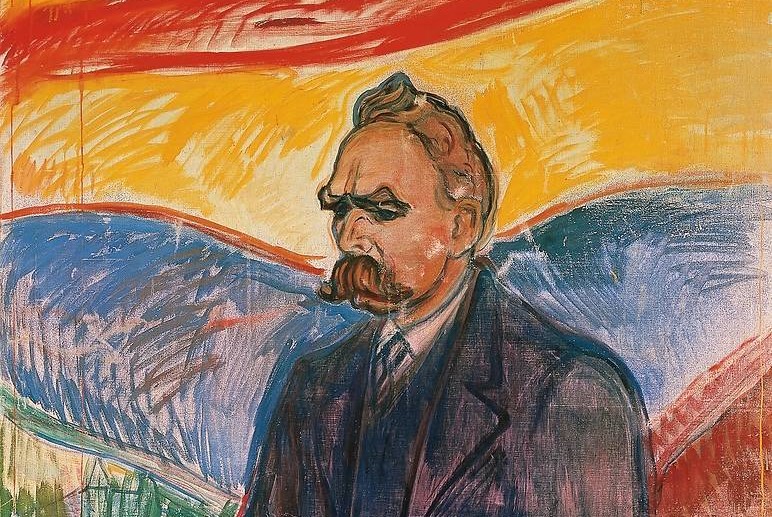The Art of Persuasion: Understanding the Sophists
Imagine living in a world where myths and legends were the only explanation for everything around you. Gods and demigods, monsters, muses, and nymphs, centaurs and cyclopes, giants, gorgons, werewolves and vampires. The sun, the stars, the seasons, and even human behaviour were all under the influence of such creatures.
But then, a group of thinkers emerge. Not happy accepting the myths handed down by the ancient poets and priests, they instead wanted to make sense of the world in their own way.
These early thinkers were the first ones to take a step back and think critically about the world around them. They observed the movements of the stars, studied the earth and the sea. They contemplated the nature of the universe and pondered the meaning of life. They were the first ones to try and answer big questions this way, and in doing so, they laid the foundation for philosophy as we know it today.
Some of the first philosophers were Thales, Anaximander, and Anaximenes from ancient Greece, but also Confucius and Laozi from ancient China. They were all different, but they all had one thing in common: a burning curiosity about the world and a desire to understand it.
In this set of articles, we will explore some of the great Western minds that have shaped the way we think today. We will begin with the Sophists, a group of ancient Greek philosophers who were known for the ability to argue both sides of any issue. They continued the tradition of philosophical inquiry, but also challenged the traditional notions of truth and knowledge. Socrates would challenge the Sophists and refine the concept of truth and knowledge. Then, we’ll move on to Aristotle, a rigorous polymath who studied and spoke about a wide array of disciplines, from ethics and souls, to poetry, logic, and politics.
We will look at the thoughts of Epicurus, who would introduce the idea of pleasure as the ultimate goal in life, and Immanuel Kant, who would argue in favour of moral duty and universal morality. Then we will see how Utilitarianism proposed that the moral value of an action is determined by its usefulness in promoting the overall happiness of society. We will also explore the philosophy of Friedrich Nietzsche, who would question traditional morality and introduce the concept of the “Superman”, and finally Jean-Paul Sartre, who would propose that individuals are responsible for creating their own meaning and purpose in life.
Philosophy has a vast history. In this series we will meet and see how some of its greatest minds have shaped the way we think and reason.
i. Enter the Sophists
The first Western philosophers were a group of ancient Greek thinkers who lived around the 6th century BCE. These philosophers, usually identified as the “Presocratics,” were interested in understanding the nature of the universe, the principles of reality and the origin of the cosmos. Starting with Thales, they believed that everything in the world could be explained by natural causes. They contributed to the development of various fields such as cosmology, metaphysics, and ethics, and their ideas would later be developed by later philosophers.
The Sophists were different from these first philosophers in that they were more interested in understanding the human experience. They were travelling teachers and educators, roaming from city to city, teaching young and wealthy people how to argue persuasively in the law courts and the assembly. Known for their ability to argue both sides of any issue, and they believed that truth was relative and could change depending on the context. Some of the important Sophist philosophers were Protagoras, who’s considered the first human philosopher, and Gorgias, who is considered the father of rhetoric.
ii. Protagoras
Our first character is Protagoras. Born in Abdera, Thrace, a city on the coast of northeastern Greece in the 5th century BCE, he was active as a teacher and intellectual in Athens, which was a major center of intellectual and cultural activity in ancient Greece. Protagoras is understood to have been a friend and associate of other important figures of his time, such as Pericles, the powerful statesman and general who led Athens during its golden age. He was also well-travelled and had visited many cities in Greece and other parts of the Mediterranean.
Known for his public speeches and debates, he was said to have charged high fees for his teachings. This led to him being criticised by some (indeed, by none other than Socrates himself) for being more interested in money than in the pursuit of knowledge.
Moral Relativism
Protagoras is known for saying “I can make the weaker case the stronger.” This quote reflects his belief in the power of rhetoric. Rhetoric is the art of speaking or writing in a persuasive manner, especially by exploiting figures of speech. While the language may be impressive, it is often regarded as lacking sincerity or meaningful content rather than focusing on the truth.
Protagoras held that the power of language was not just to communicate information, but also to shape reality. Since, according to him, truth was not something fixed and unchanging, but rather something that shifted and flowed, there is no objective truth. All our knowledge is based on perception and points of view.
In this manner, Protagoras believed that through the use of persuasive language and logical argumentation, he could make any case appear stronger, regardless of its underlying truth., with his ability to argue both sides of a case with equal skill and persuasiveness. Whether you’re the accuser or the accused, Protagoras can argue your case better than Saul Goodman.

A bit like a kaleidoscope, morality also constantly changes patterns and shades, colours and shapes. Each person sees the world through their own unique lens and what is right or wrong for one person may not be for another. Therefore, morality is relative.
Protagoras’ moral relativism is both a creative way of understanding morality, and a challenge to the traditional idea that there is a universal and objective, unchanging morality. He opened the door to explore the fundamental nature of ethics and explore the nuances of ethical decision-making.
Man is the Measure of All Things
“Of all things the measure is man, of the things that are, that [or “how”] they are, and of things that are not, that [or “how”] they are not.”
– Sextus Empiricus, Adversus Mathematicos VII 60
Protagoras’ famous saying “Man is the measure of all things” is a reminder that our understanding of the world is not just shaped by what is out there, but also by the way we look at it.
It captures his view, which we’ve met in the previous part, that human perception is the ultimate standard of truth, that that knowledge and understanding are subjective, and that the truth differs for each one of us.
This idea is a direct challenge to the belief of previous philosophers that there was a single, objective reality that could be discovered through reason and observation. The truth, for Protagoras, was not something that could be found in the world, but rather something created by the human mind.
The notion of “Man is the measure of all things” has several implications in different domains. In epistemology, the study of knowledge, it implies that knowledge is subjective and that there is no single, objective truth that can be known.
In ethics, which is the study of morality, it implies that morality is relative to the individual or society, and that what is considered good or bad, right or wrong, changes depending on the culture, time, and place. This is known as moral relativism.
In politics, it implies that laws and customs are not universal, but rather based on the specific beliefs and values of a given community or society. This can lead to a lack of common ground for moral and ethical reasoning, and can make it difficult for individuals to agree on what is right or wrong.
White this idea has its fair share of critics – including Socrates and Plato – it also highlights the importance of individual perspectives and experiences in shaping our understanding of the world.
iii. Gorgias
Moving on, we come across another notable figure in the history of philosophy. Gorgias, born in Leontini, Sicily, was a contemporary of Protagoras and was considered one of the most important Sophists of his time. He was known for his skills in rhetoric, and his ability to persuade others through his speeches.
Moral Nihilism
Gorgias introduced the idea of moral nihilism, suggesting that morality and ethical standards do not exist in this world. There is no such thing as right and wrong, good and bad. Such concepts are mere constructs of the human mind. Morality deceives us into believing in something that doesn’t really exist.
Gorgias’ nihilistic philosophy can be compared to a dark void, empty and void of any moral compass, where the only thing that exists is the individual’s subjective experience. No divine or natural law governs actions; we are free to act without moral constraints. What we tend to believe is universal moral law is nothing but a creation of ours, a fiction.
This is a significant departure from the traditional Greek belief in objective morality.
Moral Truth is Fiction
Gorgias introduced the notion that moral truth is fiction in his work “On Non-Existence”. He argues in three steps:
First, nothing truly exists. For things to exist, they must either have existed forever, or else been made by something else. Most things we see have been made by something else, but we get to a point where we ask, And who made this?
The first type of answer would be, Something else made it. We can repeat this answer only a certain amount of times until we are led into a paradox of infinite regress.
The other answer comes when we finally hit an infinite being. This was made by a being that is eternal and therefore has no limit. God is such an answer. Philosophers like St Thomas Aquinas (c.1225-1274) found this answer satisfying enough to provide it as proof for God’s existence.
However, Gorgias argues that there is a fundamental problem with such a limitless being. If something is everywhere and everything, then it loses definition, loses what makes it it. What makes a table a table and not a dog is that it fulfils those limits that allow it to exist: it’s a surface on which you can eat, write, chat, etc. But if we start counting everything as tables (dogs, cats, fish, mountains, people, planets, everything), then the concept of tables per se become so diluted that tables cease to exist. Limitless things stop existing. With them cease to exist all those things that do have limits, and therefore trace their existence to some limitless thing that made them.
Therefore, Gorgias concludes, it’s all an illusion. Nothing exists.
Second, all claims to knowledge and understanding are ultimately false. Even if something does exist (and it’s a big if), we cannot comprehend it. What happens in the mind is fundamentally different from what happens in reality.
He illustrates this by pointing out the disconnect between mental images and reality, such as imagining chariots racing in the sea. This distinction suggests that what occurs in the mind does not necessarily reflect actual reality. Therefore, our mental constructs cannot reliably comprehend or represent the external world.
Third, even if we could understand, we cannot convey that understanding: Even if someone managed to understand existence, they couldn’t communicate that understanding to others effectively. When we communicate, we use language (logos), which only conveys our thoughts, not the actual things themselves.
These thoughts are internal and subjective, making it impossible to share the exact understanding of reality with another person. Thus, true comprehension remains personal and incommunicable. It is limited to the exchange of subjective interpretations rather than objective reality.
He also argues that morality and ethics are merely human constructs, and therefore, cannot be considered true or false.
Since all ideas of good and bad are based on human perception, they are all relative and subjective. Therefore, there is no objective truth in morality. Moral claims are not based on any objective facts or reality, but rather on human conventions and subjective opinions. This means that morality is not a feature of the world that exists independently of human beings, but rather is a product of human invention.
This idea has significant implications for how we understand ethics and morality.
iv. Reaction
Other philosophers had mixed reactions to the sophists.
Some, like Plato, were highly critical and saw them as a negative influence on Greek society. Plato believed that the sophists’ emphasis on rhetoric and persuasion over truth and knowledge was detrimental to the moral and intellectual development of young people. He saw them as opportunistic and cynical, using their skill to gain power and wealth, rather than seek truth and wisdom.
In contrast, Aristotle held them in a more positive light. He acknowledged their contributions to the development of rhetoric and logic, and saw them as important figures in the history of philosophy. Aristotle also recognised that the sophists, unlike the traditional, pre-Socratic naturalistic philosophers, were more engaged with the practical concerns of politics, law, and education.
v. Legacy
In general, however, in the subsequent centuries, most philosophers would not consider the Sophists as one of them, often viewing them more as teachers of rhetoric and persuasion.
In the modern period of philosophy, they would start getting rehabilitated into the canon. They would influence later philosophers like Nietzsche and Sartre, who would also question traditional morality and advocate for the subjectivity of truth. While criticising them for being too focused on the surface-level aspects of language and rhetoric, Nietzsche admired their emphasis on the individual.
Sartre saw them as important figures in the history of Western thought, drawing inspiration from them in his own philosophy, which rejected objective morality and emphasised the freedom and subjectivity of the individual.



